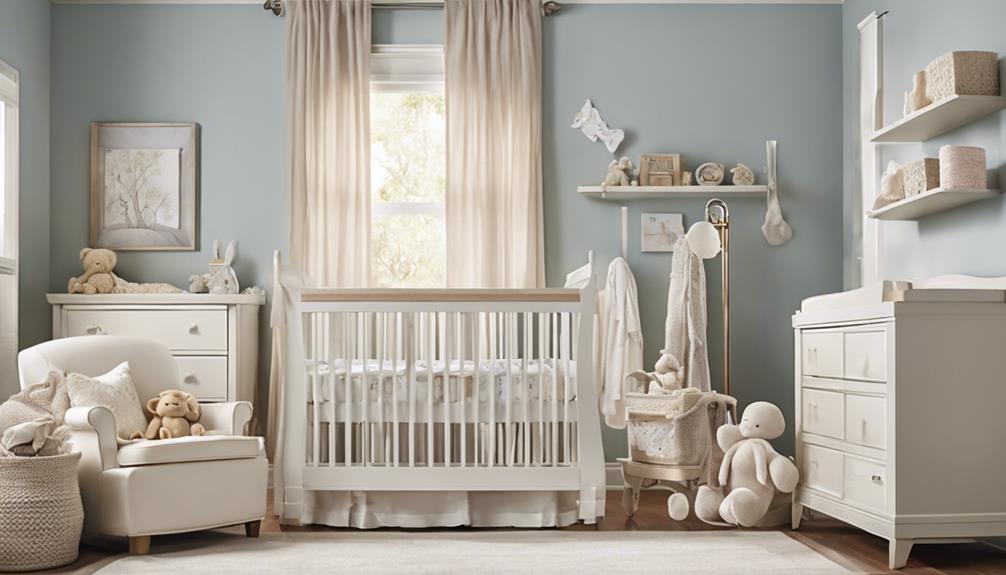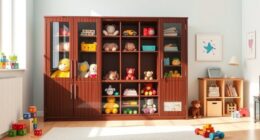When it comes to stopping newborn hiccups, it's like peeling an onion – there are layers to explore.
Have you ever wondered why those tiny hiccups can cause so much distress? Well, there are effective ways to address them that go beyond just waiting it out.
Let's unravel some practical tips that can help your little one find relief and make those pesky hiccups a thing of the past.
Key Takeaways
- Burp frequently during feedings to prevent hiccups caused by excess air intake.
- Use gentle burping techniques to release trapped air and ensure baby's comfort.
- Adjust feeding positions to minimize air swallowing and reduce the occurrence of hiccups.
- Employ soothing remedies like pacifiers and back rubs to help alleviate newborn hiccups effectively.
Common Causes of Newborn Hiccups
If your newborn is experiencing hiccups, understanding the common causes can help you manage and alleviate them effectively. Newborn hiccups often occur due to the baby's diaphragm muscle spasms, which can be triggered by fast feeding, swallowing air, or excitement. These spasms cause the vocal cords to close briefly, resulting in the characteristic sound of hiccups. While hiccups in babies are generally harmless and tend to stop on their own, some factors like overfeeding or rapid feedings can increase their frequency.
To prevent newborn hiccups, you can try feeding your baby in an upright position to minimize air intake, burp them frequently during feedings, and make sure they aren't overeating. Keeping a calm environment during feeding times can also help reduce the likelihood of hiccups. However, if hiccups persist or seem severe, it's essential to seek medical advice to rule out any underlying issues. Remember, staying informed and taking simple steps can often help manage and prevent newborn hiccups effectively.
Gentle Burping Techniques

To help alleviate newborn hiccups effectively, mastering gentle burping techniques after feedings is essential. Burping plays an important role in releasing trapped air in the stomach, reducing the chances of hiccups in newborns.
During bottle feedings, remember to burp your little one every 2-3 ounces to prevent hiccups caused by excess gas. If you're breastfeeding, burp your baby when switching between breasts to help minimize hiccups.
These simple but significant steps can aid in managing and reducing hiccups that result from trapped air in their tiny tummies. Proper burping techniques are key to ensuring your newborn is comfortable and free from unnecessary hiccups post-feedings.
Adjusting Feeding Positions

Adjust the baby's feeding position to an upright or slightly inclined angle to help reduce hiccups by guaranteeing air ingestion prevention. Keeping your little one upright during feeding and for a while afterward can assist digestion and lower the chances of hiccups happening.
Whether you choose a feeding pillow or decide to hold your baby in a semi-seated position, these adjustments can improve airflow and decrease the likelihood of hiccups interrupting your baby's feeding routine. Remember to provide proper head and neck support as you shift their position to guarantee comfort and minimize regurgitation, a common trigger for hiccups.
It might be beneficial to experiment with various feeding positions like side-lying or semi-reclined to discover the most comfortable and effective posture for your baby. By taking these steps, you not only prevent hiccups but also promote a more enjoyable feeding experience for your little one.
Soothing Remedies for Hiccups

When soothing your newborn's hiccups, consider gentle burping to release trapped air and provide relief. The following are some practical soothing remedies to help ease your baby's discomfort:
- Use a Pacifier: Offering a pacifier to your baby can help relax the diaphragm, potentially stopping hiccups in their tracks.
- Change Feeding Position: Adjusting your baby's position during and after feeding, such as holding them upright against your shoulder, may aid in stopping hiccups by allowing trapped air to escape more easily.
- Rub Their Back Gently: Lightly rubbing your baby's back in an upward motion can help alleviate hiccups by assisting in releasing any trapped air bubbles.
These simple soothing remedies can be effective in providing relief to your baby when they're experiencing hiccups. Remember to approach these remedies gently and with care, ensuring your baby's comfort throughout the soothing process.
Preventing Hiccups in Infants

Consider implementing simple feeding and burping practices to effectively prevent hiccups in your infant. Burping the baby during feedings helps release excess air from the stomach, reducing the chances of hiccups. Offering smaller, more frequent feedings can also help in preventing hiccups in infants. Make sure your baby is calm and not overly hungry before feeding to minimize the occurrence of hiccups. Seeking guidance from your healthcare provider on proper feeding techniques can further aid in preventing hiccups. Additionally, well-baby checkups provide valuable opportunities to discuss preventive strategies for managing hiccups in infants. By incorporating these preventive measures into your baby's feeding routine, you can help keep hiccups at bay and ensure a more comfortable experience for your little one.
| Preventive Strategies | Benefits |
|---|---|
| Burping during feedings | Releases excess air from the stomach |
| Smaller, more frequent feedings | Reduces likelihood of hiccups |
| Make sure a calm baby | Minimizes chances of hiccups |
| Consult healthcare provider | Gain insights on feeding techniques |
Frequently Asked Questions
How Do I Relieve My Newborns Hiccups?
To relieve your newborn's hiccups, try burping them, offering a pacifier, changing their position to upright, gently rubbing their back, or simply letting the hiccups pass naturally within 5 to 10 minutes. Trust your instincts and comfort your little one.
Is It OK to Lay Baby Down With Hiccups?
It's safe to lay your baby down with hiccups, as long as they're not distressed. Hiccups are common and usually harmless for newborns. Most will stop in 5-10 minutes naturally. If they persist, try gentle burping or position changes.
What Is the Best Position for Baby Hiccups?
When baby hiccups, hold them against your chest or in a slightly forward-leaning position. Support their head, pat or rub their back gently. Avoid laying them flat. These actions can help stop hiccups and provide comfort.
What Stops Hiccups Quickly?
If you want to stop hiccups quickly, try burping, changing positions, using a pacifier, massaging, or creating a calm atmosphere for your little one. These simple tricks can help ease those adorable but annoying hiccups.
Conclusion
Don't fret if your little one is experiencing hiccups – it's a common occurrence that can be easily managed. By using gentle techniques like burping and adjusting feeding positions, you can help stop newborn hiccups in their tracks.
Remember, a calm and soothing approach is key to ensuring your baby's comfort. Keep these tips in mind, and you'll be a hiccup-stopping pro in no time.










